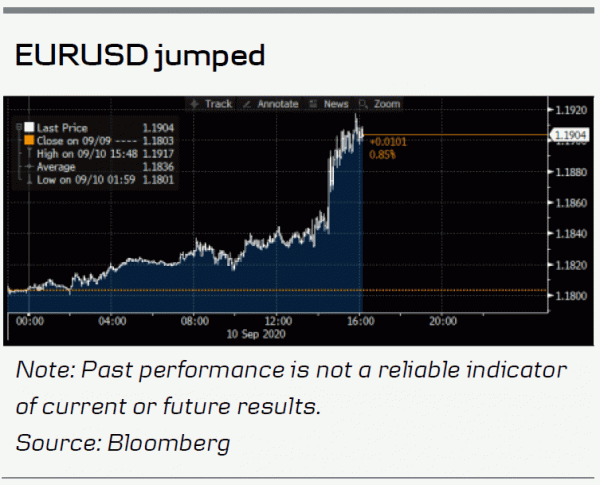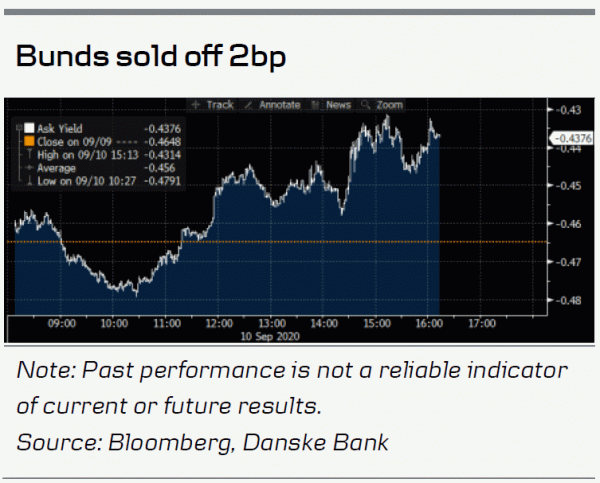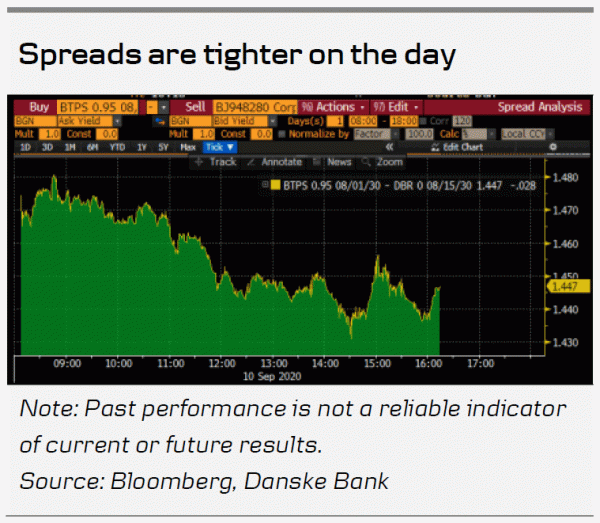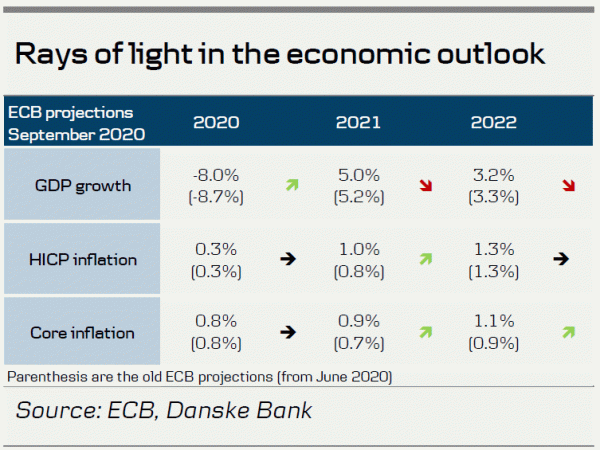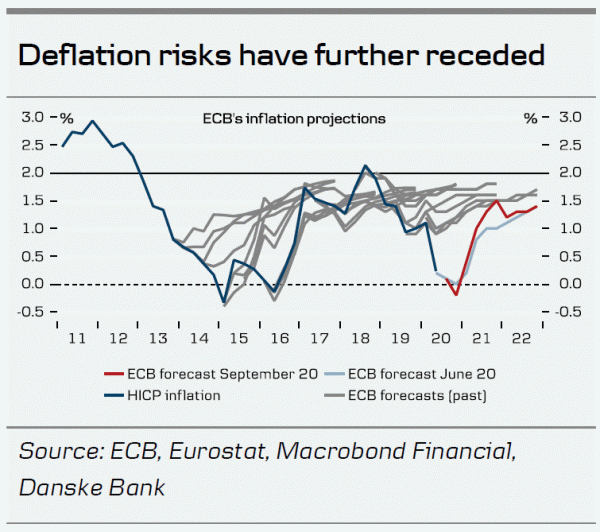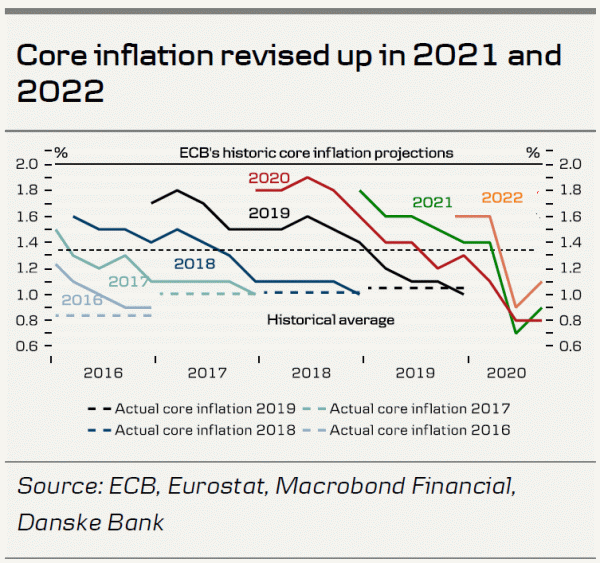The outcome of the ECB’s monetary policy meeting was in line with expectations. The ECB conveyed a confidence in its narrative of a recovery, notably in the manufacturing sector, while the language on inflation was not alarming, despite continued low inflation projections.
Bunds sold off 2bp initially, while the EURUSD jumped on headlines saying that the ECB agreed that there was no need to overreact to the euro gains.
Confident – no need for PEPP discussion today
Lagarde struck a relatively confident tone on the economic outlook, with an upbeat tilt. An expansion of the PEPP envelope was not discussed. No change in PEPP today, yet only 1.3% inflation forecast in 2022 could have warranted another PEPP calibration given that they are not set to reach the target in 2022. The fiscal push mentioned for revising core inflation higher in 2022, see more below, means that the ECB will ultimately rely on other policy areas to achieve the target. Thus the ECB’s monetary policy stance is important as part of the fiscal dominance agenda we have in Europe now.
‘We do not target the exchange rate’
In light of the high uncertainty on the recovery pace and duration, President Lagarde also stressed that the ECB will continue to carefully assess incoming information, including developments in the exchange rate and its impact on the inflation outlook. That said, at the current stage the ECB did not seem too concerned about the anti-inflationary effect of the recent euro appreciation and did not see it as an immediate trigger to adjust policy. This is in line with our view, as we have argued in Euro Area Research – Escaping the exchange rate curse, 4 September 2020.
Downplaying the importance of FX
Ahead of the ECB, the focus has been on comments related to 1) EUR-strength, 2) macro forecasts and 3) Fed’s FAIT. We continue to expect a new test of 1.20, seeing 1.23 in 3M.
As expected, the impact of FX was downplayed in Q&A. Lagarde did say they had discussed FX’s impact on inflation but we take note that she did not mention they had concluded it was a major factor as such. This may be especially so as EUR strength is a natural consequence of more upbeat macroeconomic projections. We expect the debate about where spot is fixing and how it may affect ECB communication to subside from here on.
Looking ahead, upgraded macro forecasts and still few details about the strategic review leave EUR/USD to be set by the big picture for 2021. We continue to see a global recovery, activity at a pre-COVID level by mid-2021, a Brexit resolution and fairly benign global political situation (e.g. trade). Thus, risks appear tilted to the upside in EUR/USD and next week’s Fed meeting will likely provide a test of 1.20 in spot.
No news on strategic review
There was no indication of the outcome of the strategic review in light of the Fed’s decision to change its target regime to an average inflation target. Lagarde mentioned that they have 10 work streams covering anything from payment systems, climate change, macro prudential to the ECB’s price stability objective and how to measure inflation. She did not provide an update of the timeline, which means a conclusion in H2 21 is most likely.
Core EGB bonds sold-off 2bp. Bunds to stay range bound
Fixed income markets reacted with a slight sell-off by 2bp in core markets while spreads initially widened, but are somewhat back to pre press conference levels. From a strategic point of view, today will not be remembered as a game changer. The ECB still has a lot of bonds to buy (c.EUR800bn in PEPP by June 2021) and with vol staying low, we expect Bunds to be bound range bound in a -55bp to -35bp range.
Deflation risks not around the corner
Overall, the ECB’s economic assessment struck a relatively upbeat tone at the September meeting. President Lagarde pointed to incoming data showing a strong rebound in activity, which is broadly in line with expectations. But the strength of recovery still remains highly uncertain, while services momentum has slowed as of late, not least with the rising infection rates in some euro area countries.
As expected, policymakers did not seem too concerned about deflation risks at present, pointing to the effect of Germany’s VAT cut and energy price base effects as the main culprits. In the near term, price pressures are expected to remain subdued owing to weak demand, lower wage pressures and the appreciation of the euro, despite some upward price pressures related to supply constraints. Over the medium term, a recovery in demand, supported by accommodative monetary and fiscal policies, will put upward pressure on inflation according to the ECB.
This belief was also reflected in the new staff projections, which showed an upward revision for GDP growth in 2020 to -8.0% (from -8.7%) and largely unchanged growth of 5.0% and 3.2%, respectively, in 2021/22. The outlook for inflation has also been revised up for 2021 to 1.0% (from 0.8%), while the core inflation forecast has been lifted by 0.2pp in both 2021/22, as the downward impact of the appreciation of the effective euro exchange rate is more than offset by the combined upward impact of the reversal of the German VAT cut, indirect effects of stronger oil prices as well as supportive fiscal and monetary measures.

